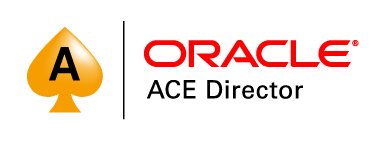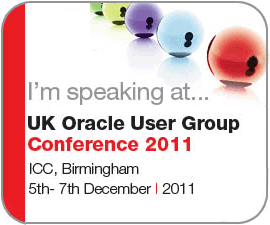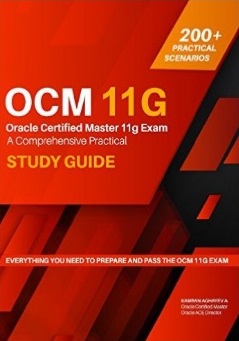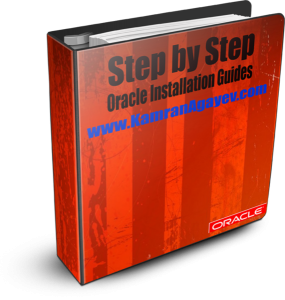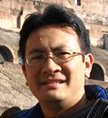 Porus Homi Havewala is a Principal Consultant with extensive experience in Oracle technology since 1994, including being a Senior Production DBA, Senior Database Consultant, Database Architect, E-Business Technical DBA, Development DBA, and Database Designer Modeller (using Oracle Designer of course). He has worked in Oracle India and is an enthusiast for Oracle technology, especially Grid Control and RMAN, on which he has conducted seminars for various large corporates and their management, and helped them to implement these powerful enterprise tools. Porus has worked for a number of years with the first production Grid Control site in the world, Telstra in Australia. He has published a number of articles on Grid Control and RMAN on OTN, and created the first blog in the world fully dedicated to Grid Control, showcasing podcasts exclusively based on this technology.
Porus Homi Havewala is a Principal Consultant with extensive experience in Oracle technology since 1994, including being a Senior Production DBA, Senior Database Consultant, Database Architect, E-Business Technical DBA, Development DBA, and Database Designer Modeller (using Oracle Designer of course). He has worked in Oracle India and is an enthusiast for Oracle technology, especially Grid Control and RMAN, on which he has conducted seminars for various large corporates and their management, and helped them to implement these powerful enterprise tools. Porus has worked for a number of years with the first production Grid Control site in the world, Telstra in Australia. He has published a number of articles on Grid Control and RMAN on OTN, and created the first blog in the world fully dedicated to Grid Control, showcasing podcasts exclusively based on this technology.
Could you please provide answer to the following questions as follows:
- Brief information about yourself and your family
I am a Parsi Zoroastrian, proudly born in India. My ancestors migrated from Iran to tolerant India about 1200 years ago after the Arabic conquest of Pre-Islamic Zoroastrian Iran, in order to preserve our ancient religion of Zoroastrianism. We are a small and highly respected minority in India, in which we have been given full freedom of worship for the last 1200 years. I am a happily married man, married to a fine lady of my own Parsi community.
Bachelor of Science, Post-Graduate Diplomas in Computer languages, Two Oracle Education Masters (Designer and Developer) from Oracle Education Australia, 10g/11g OCP, RAC certified expert, Performance certified expert.
- Your experience with Oracle. When you started first? Has it been interest of your side or just a coincidence?
I started my computing career as a Turbo C (Borland) developer, then moved to dBASE the PC database as a way to fast develop applications. In the early 1990s, the invoicing, profit/loss, export documentation dBASE applications I had wriiten for a Japanese beef export company in Australia were straining under an increasing volume of data and users. I started to investigate the client-server RDBMS world, where I was very impressed with Oracle’s Multi-version Read Consistency and multi-platform support at the database level, and Oracle CASE (Computer Aided Software Engineering) 5.1 at the development and design level – CASE 5.1 was the forefather of Oracle Designer. No other database vendor had anything like Oracle CASE at that time, which was years ahead of its time. I was hooked and convinced my boss to go for Oracle. This was in 1993-1994.
- What was the motive behind to prefer Oracle? Who you have been influenced by?
Oracle’s leading edge technology, even then, even now. Oracle’s enthusiasm for technology.
- What would your preference of profession if not Oracle?
A biomedical researcher into old age geriatics. But I didnt want to sacrifice animal lives in research. So I entered the computer field.
- What motivates you in your job?
Oracle technology, and the desire to further it’s use in the world. For example, not many people know how Oracle Audit Vault can help them in their auditing requirements. Not many people know how powerful Oracle Enterprise Manager Grid Control is, and how useful it can be.
- Do you give lectures on Oracle?
Yes, I have conducted a number of successful Oracle technical seminars in Singapore.
In late 2008 as part of business development activities, I conceptualized and conducted an extremely popular Oracle workshop series based on Oracle Enterprise Manager Grid Control: http://www.si-asia.com/marketing/gridcontrol/
From July 2009 onwards, I conducted another series of extremely successful Oracle workshops every month jointly with Oracle. The first was on Oracle RAC with Enterprise Manager Grid Control, the second on Active Dataguard and other options such as Streams and Oracle Data Integrator, the third on Patch management using Grid Control, and the fourth on the Diagnostic and Tuning Packs:
http://www.si-asia.com/marketing/oracleworkshops2009/
From February 2010 onwards, I started to conduct another monthly series of Oracle workshops jointly with Oracle. The first was on Oracle Active Data Guard 11g with Enterprise Manager Grid Control and Oracle GoldenGate. Details of the latest workshops are on :
http://www.si-asia.com/marketing/oracleworkshops2010/
- Have you authored any book in Oracle?
I am pleased to announce that my new book “Oracle Enterprise Manager Grid Control: Advanced OEM Techniques for the Real World” is getting ready to be published soon (Fall 2010) by Rampant Techpress. Please do recommend to all your friends and colleagues, it is a great handy book if you really want to make best use of Oracle Enterprise Manager Grid Control.
I have based it on a lot of practical experience and I am sure it will be useful to a lot of you.
These are my Published Articles on The Oracle Technology Network (OTN):
Using Grid Control with Filer Snapshotting
Oracle Enterprise Manager Grid Control Architecture for Very Large Sites
Oracle RMAN Backups: Pushing the “Easy” Button
Patch a Thousand Databases, Using Oracle Enterprise Manager Grid Control
Easy Disaster Proof Production with Grid Control
Using Oracle GoldenGate for Real-Time Data Integration
In December 2009, the Oracle Technology Network (OTN) published the list of Most Popular OTN articles in 2009 and two of my articles on Enterprise Manager are in the list:
http://blogs.oracle.com/otn/2009/11/the_most_popular_articles_and.html
The OTN is the world’s largest online community of Developers, DBAs and Architects.
The two articles of mine in the top 10 are:
Oracle RMAN Backups: Pushing the “Easy” Button
Oracle Enterprise Manager Grid Control Architecture for Very Large Sites
- Do you manage with your time as to read books on Oracle? What is the name of the book that you read recently?
I read Oracle books ocassionally. I recently reviewed “Oracle SQL Developer 2.1″ by Oracle’s product manager, Sue Harper.
- What do you think on OTN forums?
I try to help and advise, based on my knowledge and experience. Of course there are many other experts who know more than me.
- Do you refer to the documentation? And how often does it happen?
Oracle 10g/11g Documentation is my bible. I refer to documentation whenever I want to verify a technical point.
- What is the biggest mistake you have ever made during your DBA career?
I stopped a production listener by mistake from another server. We password protected it after that after we realized the vulnerability.
- What was your greatest achivement as an Oracle DBA?
In 2008 I was awarded the “Oracle ACE” title followed by the prestigious “Oracle ACE Director” title by Oracle Corporation USA. These titles are the FIRST such awarded in Singapore.
- What is you priority to manage the challenges you face?
Humanity first and foremost. A human being is the greatest thing on earth. There is a verse in in the Taittiriya Upanishad (Indian scripture) that says “Matru devo bhava, Pitru devo bhava, Acharya devo bhava, Atithi devo bhava” = One should treat their Mother, Father, Teacher and Guests as God.
- How would you describe the essence of your success? According to your definition of success, how successful have you been so far?
Moderately successful – by God’s Grace.
- What are your best skills which make you differ from others?
Enthusiasm for technology and an interest in writing.
- What’s your major weakness?
At times, a lack of patience.
- Have you ever lost your spirit? If so, what has been the reason and how have you overcome it?
Everyone has that phase. Just think positive – tomorrow is a new day.
- What is the next success you would like to attain and your efforts to this end?
Make the world a better place to live in.
- How do you balance your daily life with your career?
Life is life and career is career, draw a clear line.
- Please describe your one day summary of activities?
Work. Do something good. Help someone.
Learn. Learn something nice. Teach someone.
Eat simple. Think of God. Sleep.
- How many hours do you work and sleep in a day?
I try to sleep at least 6 hours.
- Where and how do you spend your daily, weekly and annual holidays?
At home or shopping.
- Do you think about Oracle during vacations?
Vacations are for thinking of my family.
- Do you have time or motivation to go in for any sports? If yes, which kind of sport do you go in for?
Only walking, which was Mahatma Gandhi’s favourite exercise.
- What’s your favorite meal and non-alcoholic drink?
Parsi dishes made from the fresh food in India is delicious.
Sugarcane and Mango juice – the sweetest is in India.
- What foreign languages do you know?
English, Hindi, Gujarati (my mother tongue).
- What’s your average typing speed?
I am a one-finger typist.
- Have you ever get involved in politics?
No.
Blogging. Writing. Technical as well as spiritual topics.
The popular blog I maintain is http://enterprise-manager.blogspot.com with Oracle Press credentials, and has received more than 8,000 visits since 2008 from all over the world.
I am also the author of a Zoroastrian book, “Saga of the Aryans” (http://saga.zoroastrianism.com)
- How do you spend your free time?
Watch movies, Indian and English, also documentaries. Read Wikipedia.
- What’s your biggest ambition?
To help humanity.
- What would be your advice to the beginners in Oracle?
Have patience. You become a DBA only after years of experience.
- Would you like your children to follow in your footsteps or take a different path in life?
First and foremost, they should never forget humanity.
- Do you have any followers of you?
I have friends not followers.
- What is your vision on the future of Oracle?
Oracle has an awesome future.
- Could you please take a photo in your office near to your desktop?
This is me conducting the most recent “Oracle Database Security” Seminar for Oracle and S&I Systems (Platinum Partner) at the Sun Solution centre auditorium in Singapore.


